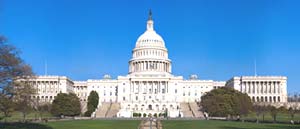US Congress approves $787 billion stimulus plan
14 Feb 2009
The US Senate has voted in favour of a $787 billion economic stimulus plan clearing the way for it to be signed into law. The vote came hours after the House of Representatives passed the measure without Republican backing.
 President Barack Obama's $787 billion economic stimulus plan is designed to help repair the economy through tax cuts for businesses and families and a half-trillion dollars in federal spending.
President Barack Obama's $787 billion economic stimulus plan is designed to help repair the economy through tax cuts for businesses and families and a half-trillion dollars in federal spending.
The version approved by the Congress on Friday is a compromise hammered out with Senate negotiators after each chamber approved a prior version. (See: US Congress set to vote on stimulus plan / Senate follows House in approving President Obama's $800 billion-plus stimulus plan / House passes rescue bill sans GOP backing )
All 176 Republicans and seven Democrats in the Senate voted against the revised package in the House. It was backed by 246 House Democrats.
Three Republicans in the Senate voted for the package.
The rebel votes were enough to stop the Republican Party using blocking tactics to delay the stimulus plan, and it passed 60-38.
Earlier the House of Representatives voted 246 to 183 for the measure with no Republicans in favor. Republicans opposed the measure, saying it included too much spending and not enough tax cuts and that it wouldn't do enough to boost the economy.
''After all the debate, this legislation can be summed up in one word: Jobs,'' said House Speaker Nancy Pelosi, a California Democrat. ''The American people need action and they need action now.'' The package is designed to create or save 3.5 million jobs, Obama and Democrats in Congress have said.
The stimulus plan's centerpiece is a $400 payroll tax cut for individuals and $800 for couples. Retirees, disabled veterans and others who don't pay payroll taxes would get a $250 payment. It also spends $6.6 billion on a tax-credit for first-time homebuyers.
Businesses won several tax breaks, including faster write-offs for equipment purchased in 2009 and incentives for companies that produce and invest in renewable resources such as solar and wind power. A business tax break pushed by the US Chamber of Commerce would ease near-term tax burdens on companies and buyout firms that restructure debt without entering bankruptcy.
Lawmakers agreed to spend $30 billion to modernize the electric grid, spur advanced battery manufacturing and fund energy efficiency projects. There is $29 billion included for road and bridge infrastructure construction and $19 billion for hospitals and doctors who computerize their medical records.
Obama has campaigned feverishly for the stimulus, pouring enormous amounts of political capital into its passage and touting it as a necessary step to head off economic catastrophe. Some of the effects of the bill will be felt immediately, but many will be slow to kick in.
According to the Congressional Budget Office, the stimulus would boost employment by between 800,000 and 2.3 million by the end of this year. By the end of 2010, the bill would create 3.6 million jobs, CBO estimated.
The nonpartisan Congressional Budget Office said the stimulus package would cost $787 billion rather than $789 billion as lawmakers estimated. The plan would pump $185 billion into the economy this year and $399 billion next year, the agency said.

















